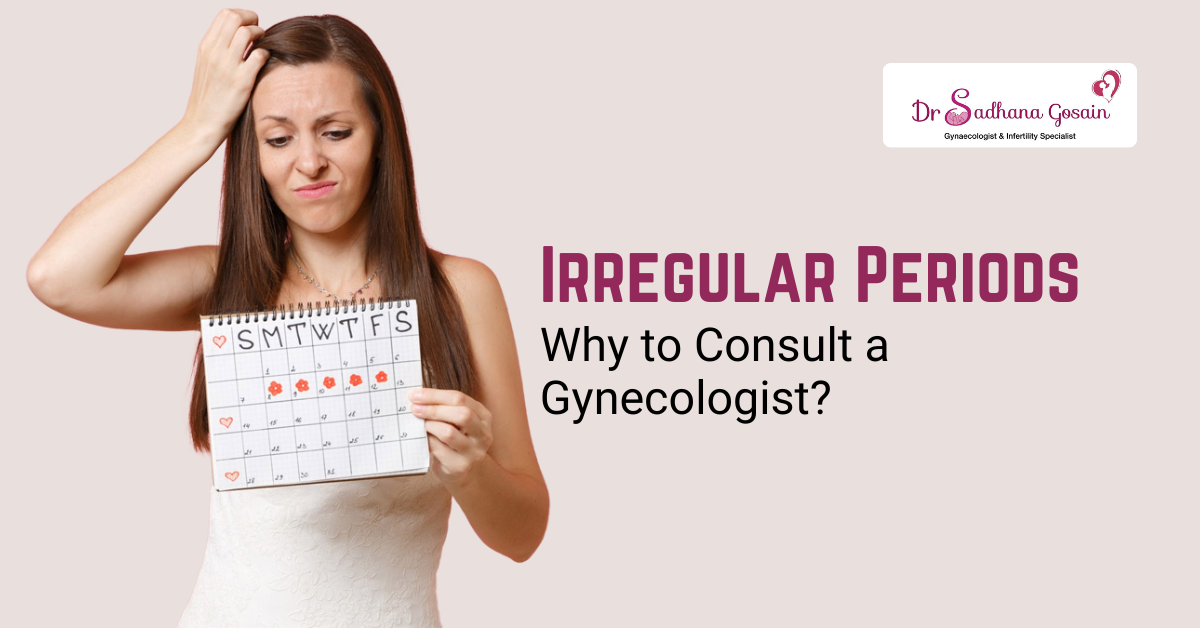Irregular Periods – Why to Consult a Gynecologist?
Irregular periods are a common concern among women and can be a sign of underlying health issues that should not be ignored. While occasional irregularity might not be a cause for concern, consistent disruptions in your menstrual cycle could indicate a deeper problem. Consulting a gynecologist is crucial to identify the root cause and receive proper treatment.
If you are in Delhi, Dr. Sadhana Gosain, a trusted and experienced gynecologist, is here to help you with personalized care and effective solutions.
Understanding Normal and Irregular Menstrual Cycles
A normal menstrual cycle ranges between 21 to 35 days and typically lasts for 3 to 7 days. When periods deviate from this pattern, it is classified as an irregular period.
Irregular periods can manifest in different ways, including:
- Missed periods
- Short or long cycles
- Unusually heavy or light bleeding
- Bleeding between periods
Causes of Irregular Periods
Irregular periods can result from various factors, including lifestyle habits, hormonal changes, or underlying medical conditions. Here are some common causes:
- Stress and Lifestyle Changes
Stress, travel, sudden weight loss or gain, and changes in sleep patterns can affect your menstrual cycle. - Polycystic Ovary Syndrome (PCOS)
PCOS is one of the leading causes of irregular periods. Women with PCOS experience hormonal imbalances that disrupt ovulation, leading to missed or irregular periods. - Thyroid Disorders
Both hyperthyroidism and hypothyroidism can impact your menstrual cycle. - Uterine Fibroids or Polyps
These non-cancerous growths in the uterus can cause heavy or irregular bleeding. - Perimenopause
In the years leading up to menopause, hormonal fluctuations can lead to irregular periods. - Birth Control or Medication
Certain birth control methods, such as hormonal IUDs or pills, can cause changes in your menstrual cycle. - Chronic Illness
Conditions like diabetes, celiac disease, and liver disorders can also affect menstruation.
Why You Should Consult a Gynecologist for Irregular Periods
Irregular periods are not just a minor inconvenience; they could be a sign of a serious health issue. Here’s why it’s essential to consult a gynecologist:
1. Early Diagnosis of Underlying Conditions
A gynecologist can help detect conditions like PCOS, endometriosis, or thyroid disorders early, preventing complications.
2. Proper Hormonal Balance Assessment
Irregular periods often indicate hormonal imbalances. A gynecologist can run tests to determine the exact cause and provide targeted treatment.
3. Personalized Treatment Plan
Every woman’s body is different. A gynecologist will create a personalized plan based on your symptoms, lifestyle, and medical history.
4. Fertility Concerns
If you are planning to conceive, addressing irregular periods is crucial for improving your chances of pregnancy.
5. Prevent Long-Term Health Risks
Untreated conditions like PCOS or thyroid disorders can lead to long-term issues such as infertility, heart disease, or diabetes. Regular gynecological care can help mitigate these risks.
Meet Dr. Sadhana Gosain – Trusted Gynecologist in Delhi
If you are experiencing irregular periods, it’s time to consult an expert. Dr. Sadhana Gosain, one of the best gynecologists in Delhi, specializes in treating menstrual disorders, PCOS, infertility, and other gynecological conditions. With years of experience, she provides compassionate, patient-centric care to women of all age groups.
Why Choose Dr. Sadhana Gosain?
- Extensive experience in managing menstrual and hormonal disorders
- A personalized and empathetic approach
- State-of-the-art diagnostic and treatment facilities
- Patient-focused care with excellent outcomes
When to Book an Appointment with a Gynecologist?
You should seek medical advice if you experience any of the following symptoms:
- Missed periods for three or more consecutive months
- Extremely heavy or prolonged periods
- Severe pain or cramping during periods
- Bleeding between periods
- Symptoms of hormonal imbalance, such as excessive hair growth, weight gain, or acne
Early intervention can prevent complications and improve your quality of life.
How to Prepare for Your Gynecologist Appointment
- Track Your Cycle – Keep a record of your menstrual cycle, noting the duration and any unusual symptoms.
- List Your Symptoms – Mention any additional symptoms such as fatigue, weight changes, or mood swings.
- Bring Your Medical History – Inform your gynecologist about past surgeries, medications, or family history of gynecological conditions.
Dr. Sadhana Gosain ensures that her patients feel comfortable and heard during consultations, making the diagnostic process stress-free and effective.
Treatment Options for Irregular Periods
Depending on the underlying cause, treatment for irregular periods may include:
- Lifestyle Modifications – Improving diet, managing stress, and regular exercise can help restore hormonal balance.
- Medications – Hormonal therapy, thyroid medication, or insulin-sensitizing agents for PCOS may be prescribed.
- Surgical Interventions – In rare cases, surgery may be necessary for fibroids or polyps.
- Fertility Treatment – For women with irregular periods trying to conceive, fertility medications or assisted reproductive techniques (ART) may be considered.
Book an Appointment with Dr. Sadhana Gosain
Are you struggling with irregular periods or other menstrual issues? Don’t ignore the signs. Schedule an appointment with Dr. Sadhana Gosain for expert advice and treatment.
Booking your appointment is easy!
Take the first step toward better health and peace of mind today. Dr. Sadhana Gosain is here to guide you every step of the way.
Also Read:
View this post on Instagram
FAQs about Irregular Periods
1. What causes irregular periods?
Irregular periods can be caused by stress, lifestyle changes, PCOS, thyroid disorders, uterine fibroids, and perimenopause.
2. Can irregular periods affect fertility?
Yes, irregular periods can impact ovulation, reducing your chances of conceiving. It’s important to consult a gynecologist if you are planning a pregnancy.
3. How are irregular periods diagnosed?
A gynecologist will conduct a physical exam, review your medical history, and recommend tests like blood work, ultrasound, or hormone level assessment.
4. What treatments are available for irregular periods?
Treatment varies depending on the cause and may include lifestyle changes, medications, hormonal therapy, or surgery.
5. When should I see a gynecologist for irregular periods?
If you miss periods for more than three months, experience heavy bleeding, severe pain, or other concerning symptoms, consult a gynecologist immediately.
Conclusion
Irregular periods are more than just an inconvenience—they could be a sign of an underlying health condition. Consulting a gynecologist like Dr. Sadhana Gosain can help you identify the cause and find an effective solution. Don’t delay your health. Book your appointment today and take control of your well-being.
Also Read:



